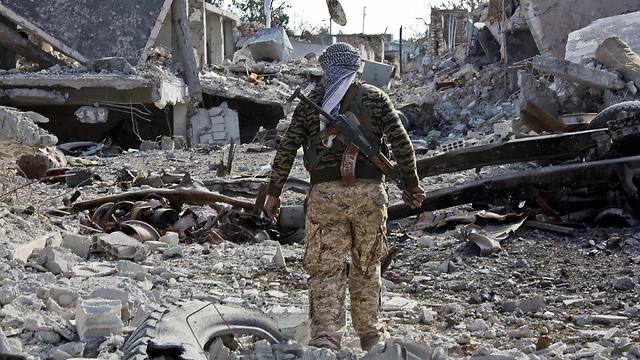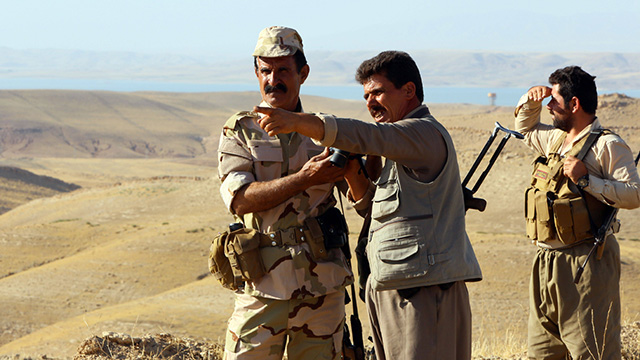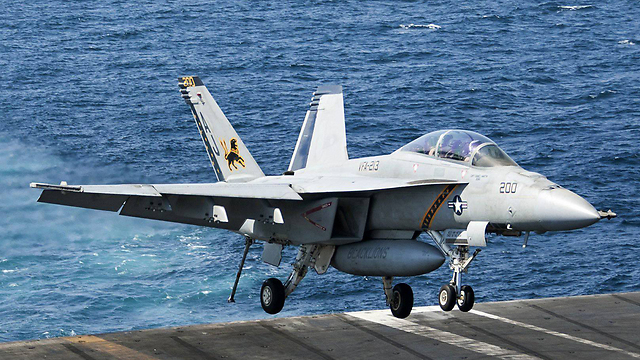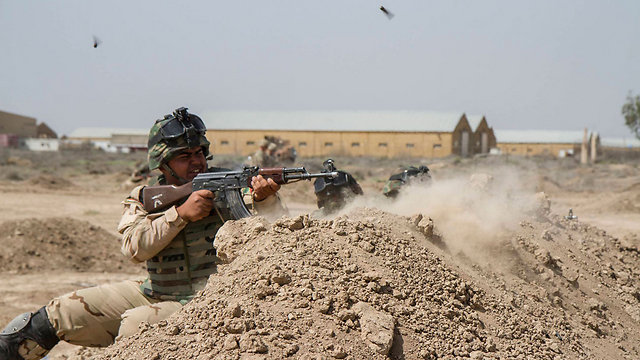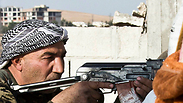
US investigating whether Islamic State used chemical weapons
Kurdish officials say ISIS used what is believed to be chemical weapons in Iraq against peshmerga; senior US official tells Wall Street Journal agent used was mustard gas.
The United States is investigating whether the Islamic State used chemical weapons, the White House said Thursday, following allegations that IS militants deployed chemical weapons against Kurdish forces in northern Iraq.
"We have credible information that the agent used in the attack was mustard," a senior US official told the Wall Street Journal.
Islamic State could have obtained the mustard agent in Syria, whose government admitted to having large quantities of the blistering agent in 2013, when it agreed to give up its chemical weapons arsenal, the newspaper reported.
Islamic State could also have obtained the mustard agent in Iraq, the Journal reported.
Alistair Baskey, a spokesman for the White House's National Security Council, said the US is taking the allegations "very seriously" and seeking more information about what happened. He noted that IS had been accused of using such weapons before.
"We continue to monitor these reports closely, and would further stress that any use of chemicals or biological material as a weapon is completely inconsistent with international standards and norms regarding such capabilities," Baskey said in a statement.
Earlier Thursday, Kurdish officials said their forces, known as peshmerga, were attacked the day before near the town of Makhmour, not far from Irbil.
Germany's military has been training the Kurds in the area, and the German Defense Ministry said some 60 Kurdish fighters had suffered breathing difficulties from the attack, a telltale sign of chemical weapons use. But neither Germany nor the Kurds specified which type of chemical weapons may have been used.
Confirmation of chemical weapons use by IS would mark a dramatic turn in the US-led effort to rout the extremist group from the roughly one-third of Iraq and Syria that it controls.
Although the US and its coalition partners are mounting airstrikes against the Islamic State, they are relying on local forces like the Kurds, the Iraqi military and others to do the fighting on the ground. Already, those forces have struggled to match the might of the well-funded and heavily armed extremist group.
At the United Nations, US Ambassador Samantha Power said the US was speaking with the Kurds who had made the allegations to gather more information. She said that if reports of chemical weapons are true, they would further prove that what IS calls warfare is really "just systematic attacks on civilians who don't accord to their particularly perverse world view."
"I think we will have to again move forward on these allegations, get whatever evidence we can," Power said.
She added that as a result of earlier chemical weapons use by the Syrian government, the US and its partners now have advanced forensic systems to analyze chemical weapons attacks. She said anyone responsible should be held accountable.
Similar reports of chemical weapons use by IS had surfaced in July. But it's unclear exactly where the extremist group may have obtained any chemical weapons.
Following a chemical weapon attack on a suburb of the Syrian capital of Damascus in 2014 that killed hundreds of civilians, the US and Russia mounted a diplomatic effort that resulted in Syrian President Bashar Assad's government agreeing to the destruction or removal of its chemical weapons stockpiles.
But there have been numerous reports of chemical weapons use in Syria since then, especially chlorine-filled barrel bombs. The Organization for the Prohibition of Chemical Weapons, the global chemical weapons watchdog, has been investigating possible undeclared chemical weapons stockpiles in Syria.
Word of the White House's probe into possible chemical weapons use by IS came as President Barack Obama was vacationing with his family in Martha's Vineyard in Massachusetts.
Also on Thursday, IS militants claimed responsibility for a truck bombing at a Baghdad market that killed 67 people in one of the deadliest single attacks there since the Iraq War.
Surge US bombing of ISIS in July
The US bombing campaign against Islamic State rebels surged in July as Kurdish fighters pushed into territory held by the militant group in Syria and Iraqi forces prepared an offensive to retake strategic northwestern cities, Pentagon figures showed.
The US military spent an average of $4.6 million per day on bombs and other munitions between July 15 and July 31, nearly double the daily average of $2.33 million spent in the previous month.
Lieutenant Commander Kyle Raines, a spokesman for US Central Command, said the number of bombs and other munitions used in July increased by 67 percent over the previous month, jumping from 1,686 to 2,829.
One defense official said the late July bombing was the second most intense since the campaign started a year ago, topped only by a two-week period in September when the US-led coalition began operations in Syria.
"We began conducting larger operations in late July, thus requiring a larger number of munitions," Raines said.
Kurdish fighters in Syria solidified their control over areas near the border with Turkey and began to push deeper into Islamic State-held territory. At the same time, Iraqi forces began preparing to recapture the Anbar capital Ramadi.
Defense officials and analysts said the jump in bombs dropped also likely reflected better coordination between local fighters on the ground who identify targets and US troops who have to approve the targets and direct the strike aircraft.
Daily US air strike reports show that coalition attacks in Syria at the end of July intensified around al Hasaka, which was contested by Kurdish forces, and Deir al-Zor, a strategic town between the group's capital Raqqa and the Iraqi border.
"Air strikes have expanded further into Syria, and the advances of anti-ISIL forces on the ground open up more targeting opportunity against ISIL," Raines said, using an acronym for the Islamic State.
"For Iraq, coalition air strikes continue to shape the battlefield and lay the groundwork for Iraqi security forces," he said.
Daily reports released by Central Command show that the number of air strikes in late July essentially remained flat, suggesting that the airplanes involved the strikes were, in fact, finding targets and releasing a larger proportion of their weapons.
The air campaign has seen the heaviest use ever of precision weapons. Through June, 98 percent of the weapons used in the conflict were precision guided, compared to 68 percent in the 2003 Iraq war.
Where air forces once dropped thousands of tons of bombs per target, US pilots now drop between one and two per target.
Despite the intensified bombing in late July, the overall US effort against Islamic State militants remains small compared to other American wars.
Pentagon figures released late last week showed the United States spent nearly $3.5 billion on the war against Islamic State between Aug. 8, 2014, and July 31, 2015.
If the daily average continued for another week, the cost of the first full year of the war would be just under $3.6 billion. That is about what the Pentagon spends each month on the scaled-back mission in Afghanistan, which involves some 9,800 troops.
Spending on munitions during the last two weeks of July was more than $4.6 million per day, nearly double the $2.33 million daily rate over the previous month, the figures showed.










